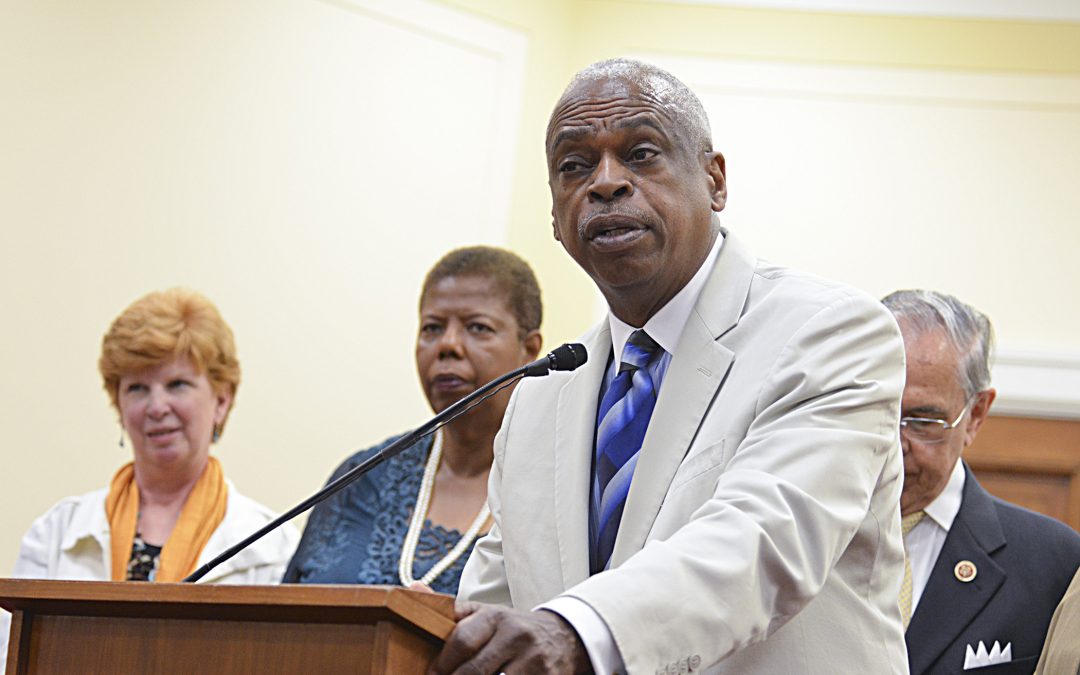
by NNPA ESSA | Sep 25, 2018 | Betsy DeVos, K12 Education, NAACP, National, NNPA, NNPA Newswire, nnpaESSA, Urban League, US Department of Education
By Lauren Poteat, NNPA Washington Correspondent
After the unveil of explosive reportswhereU.S. Education Secretary Betsy DeVos, openly considered allowing schools to use federal Every Student Succeeds Act (ESSA) funding, to purchase firearms and provide firearm training to educators, members of theLeadership Conference on Civil and Human Rights (TLC) have stepped in with an open letterto the same administrator—in protest.
Comprised of over 200 national organizations working together to promote and protect civil and human rights of all people, the open TLC letter was released on Sep. 17, demanding that “the department immediately publicly clarify, that ESSA funds could not be used for weapons.”
“On behalf of The Leadership Conference on Civil and Human Rights… we write to share our significant concern regarding the Department’s reported contemplation of the use of Student Support and Academic Enrichment grants provided to states under the Every Student Succeeds Act (ESSA) for purchasing firearms and firearms training for school staff,” the letter stated.
Questioning the department’s intent, the letter further went on to the explore the risks of increased violence that this option could potentially cause.
“The Department’s consideration of this use for the funding is inconsistent with both congressional intent and evidence-based educational practices, working against ESSA’s purpose to ‘provide all children significant opportunity to receive a fair, equitable, and high-quality education, and to close achievement gaps.’ Having more firearms in schools would expose children and school staff to a greater risk of gun violence and make everyone in schools less safe,” the letter continued.
Since issuing these statements in late August, that were said to be sparked by requests from Texas and Oklahoma to tap into federal money to pay for “school marshals, Devos has ultimately left the decision to local districts to decide on how they would like to use the ESSA grant money.
Inher letter to Congress, DeVos stated that she would not take “any action concerning the purchase of firearms or firearms training for school staff,” however, Marc Morial, president of the National Urban League and a member of TLC, reflected that an ‘option’ such as this, should have never even been presented.
“This is whole idea is just lousy and makes no sense,” Morial said. “ESSA money should be used to by books and give disadvantaged youth a chance at better education. African Americans already face large amounts of gun violence outside of school, so to even propose such an idea is an added insult to injury.”
“School should be a safe haven for students and there is not one scant of evidence that shows children are safer around guns. The National Urban League does not want or support this,” Morial continued.
In agreeance with TLC’s belief that ESSA funding should not be used to support guns in school, last week the state of New York issued their own memo to school district leaders, stating that they would not allow schools to use federal or state money to buy guns.
“We simply cannot afford to use federal education dollars that are intended for teaching and learning to pay for weapons that will compromise our schools and communities,” New York Education Commissioner MaryEllen Elia wrote.
In a report done by CNN, Black Americans (particularly males), were shown to be more likely to die and to be involved with gun violence over their White counterparts, a startling statistic that the NAACP Legal Defense & Educational Fund (LDF), an legal organization devoted to fighting for racial justice,fears might spill into the classroom, should states actively pursue such an option.
“We need the department of education to immediately and publicly clarify, that ESSA funds cannot be used for weapons,” Nicole Dooley, a LDF general counsel member said. “The only thing that this option will do is place more students at risk, especially African Americans, who experience implicit bias daily. The purpose of ESSA is to improve educational opportunities, not to create more dangerous practices.”

by NNPA ESSA | Aug 4, 2017 | Betsy DeVos, Education Week, ESSA, Every Student Succeeds Act, Every Student Succeeds Act (ESSA), Florida, K12 Education
By Daarel Burnette II on August 4, 2017 1:40 PM
A national coalition of civil rights groups want U.S. Secretary of Education Betsy DeVos to reject Florida’s soon-to-arrive waiver request that will ask to be relieved from key pieces of the Every Student Succeeds Act dealing with the nation’s most vulnerable and historically disadvantaged students.
Approving Florida’s request, activists say, will set a disturbing precedent for other states.
“Sometimes it feels like we’re playing three-card monte or a game of cat and mouse,” said Liz King the Director of Education Policy for The Leadership Conference on Civil and Human Rights. She said approving the waiver request will effectively make ESSA toothless. “Everytime we make progress, someone finds a way to cut it back.”
The waiver, still in draft form, asks for the state to be allowed to forego using minority student subgroups and the results of English-learners’ language proficiency exams in its statewide accountability system. And because Florida education officials say English is the state’s official language, it doesn’t want to conduct standardized tests in recently-arrived immigrant students’ native languages.
Those provisions were the biggest victories for national civil rights activists when ESSA was passed in 2015 and they fear that if Secretary DeVos approves the waiver this fall, other states, eager to break free from decades of federal badgering over the nation’s stagnant achievement gap, would follow suit.
The Florida education agency gathered feedback on the request over several weeks and it’s expected to soon be considered by Republican Gov. Rick Scott. It has broad support from the state’s district superintendents who want to keep the state’s politically volatile accountability system mostly intact.
This week, the Leadership Conference, made up of 23 minority rights groups, sent a tersely worded letter to all 51 state superintendents urging them to follow the law as written rather than follow in Florida’s footsteps.
“Low-income children, children of color, children with disabilities, English-learners, and Native children have been left behind for far too long and deserve no less than robust and thorough state policy to ensure an excellent and equitable education,” the letter said.
The League of United Latin American Citizens (LULAC) also sent a letter to congressional leaders and Secretary DeVos that more specifically urges her to reject the waiver request outright since, they say, the request flies in the face of ESSA’s civil rights legacy and circumvents the state’s legal obligations to English-language learners.
And a group of local civil rights activists in Florida will ask next week for a sit-down meeting with Florida department officials.
The department said in an e-mailed statement that they welcome any feedback to its plans.
“We appreciate everyone who took the time to submit input on Florida’s ESSA draft state plan,” said Meghan Collins, a spokeswoman for the department.
In its waiver request, the department said their accountability system is meant to improve the outcomes of all students, rather than students with a particular ethnicity, special need or language requirement. Instead of English proficiency exams, the state wants to use its English Language Arts test to measure ELL students’ langauge acquisition.
But the civil rights groups say that flies in the face of decades of research regarding how to close achievement gaps between minority students and their peers. Because the state for so many decades segregated its schools and denied a litany of basic education services to minority students and students with special needs, the state is obligated to provide tailored remedies to those groups’ unique needs.
“If this waiver is approved, there will be no accountability whatsover for ELL students’ progress in English Language acquisition,” said Rosa Castro-Feinberg, a civil rights activist, education consultant and former school board member in the Miami-Dade district. “I think the department has been misadvised by folks who are not up on the research related to ELL issues and subgroup accountability issues.”
One out of every 10 students in the state qualifies for ELL services.
The waiver request will create a political dilemma for Secretary DeVos who has been criticized both for her theories on the department’s role in upholding civil rights and her department’s feedback to states’ submitted plans.
“One thing we’re learning through the ESSA implementation process is that too often the decision makers at the federal, state and local level are disconnected from children who aren’t getting a fair shakeout from policy decisions,” King said.

by Alyson Klein | Jul 1, 2017 | Betsy DeVos, Education Week, ESSA, Every Student Succeeds Act, Every Student Succeeds Act (ESSA), K12 Education, National
U.S. Secretary of Education Betsy DeVos and her team are giving states and districts an extra year to comply with new financial transparency requirements in the Every Student Succeeds that are aimed at shining a light on how much schools spend on each student. And at least one key civil rights group is unhappy about the delay.
ESSA calls for states to report per-pupil expenditures for all their schools on school report cards for the first time beginning in the 2017-18 school year. The requirement was intended in part to help local policymakersâand the public figure out if there are significant spending disparities between schools that serve high percentages of poor kids and other schools, and whether schools that lag behind in student achievement are getting as much money as more successful schools.
When ESSA passed, civil rights advocates were excited about the new transparency around per-pupil spending. But school superintendents and state leaders warned that providing that sort of detailed data on such a tight timeline could be a tough lift. The Education Department is giving states until the 2018-19 school year to begin putting the per-pupil expenditure information on their report cards…
Read the full article here. May require an Education Week subscription.

by NNPA ESSA | Mar 3, 2017 | ESSA, Every Student Succeeds Act, Every Student Succeeds Act (ESSA), Featured, Featured, National, NNPA, resources
By Wade Henderson (President and CEO, The Leadership Conference on Civil and Human Rights)
For the first time in our nation’s history, the majority of students in public schools are students of color. But in most places, communities of color still have little meaningful say in how their states manage and resource education. As a result, too many students in this new majority are in overcrowded classes and inadequate facilities where teachers are overworked, underpaid and stuck with a curriculum that lacks rigor and relevance.
All students deserve the opportunity to learn and work hard in a healthy environment with excellent teachers, but even 62 years after Brown v. Board of Education, our nation is reeling from the unfulfilled promise of an equal education for all. Educational equity is vital to our nation; two-thirds of all future jobs will require some level of higher education, and research suggests that within the next 10 years, our economy will face a deficit of 11 million skilled workers. Continuing policies that fail to prepare all students for college and careers is an immoral and self-defeating choice that stunts our nation’s economic potential — and mocks our democratic ideals.
But now there’s an opportunity for states, districts and schools to make a better choice. The Every Student Succeeds Act, or ESSA, the federal education law Congress passed late last year, requires that parents and communities be meaningfully engaged in determining how states equitably educate their children.
Under ESSA, every single state and school district is confronted with a question of enormous consequence: Will they work with new majority communities to develop plans and policies that ensure excellent schools for all children? Or will they continue to make their decisions in a bubble, avoid accountability and do a disservice to students in the process?
Progress is not guaranteed. For this new law to improve education for every student, states need to put communities in the driver’s seat and focus on the interests of marginalized students. We have always had strong, clear and diverse voices demanding that our education system serve the interests of their children — but decision-makers rarely listen.
Recent research shows that Black and Latino parents understand what the problems exist in their children’s schools — and they have clear ideas about what should change. They know that the schools their children attend don’t get as much funding as schools White children attend; they know their children aren’t getting as good an education as White children; and they know that race is at least one of the reasons why. But they also believe good teaching and high expectations are critical and they want both for their children.
This is all information that states should be taking into account when determining their policies and programs under the new law. And to do that, states, districts, and schools have to engage new majority parents and communities. They have to build strong accountability systems that identify and target meaningful support and improvement in any school where all students — or any group of students — are not learning. They have to provide robust data and reporting about how well schools are educating students and they have to provide them in formats and languages that parents can understand. And, as communities of color demand, they have to distribute resources — high-quality teachers, challenging coursework, up-to-date facilities and classroom materials — more equitably.
Last year during the debate over the new law, states argued that they were in the best position to make decisions that would benefit all students. Now is the time to prove it.
Every single child in this great country deserves a world-class education. But that can’t happen if states and districts ignore the priorities of the families they serve. Experience shows that this can be done. All we need is the will to sit down, open our minds and listen to what all families are saying.
Wade Henderson is president and CEO of The Leadership Conference on Civil and Human Rights, a coalition of more than 200 diverse civil rights organizations. Follow The Leadership Conference on Twitter @civilrightsorg and learn more about their work at http://www.civilrights.org.
PHOTO CAPTIONS: Wade Henderson, the president and CEO of The Leadership Conference on Civil and Human Rights says that Continuing policies that fail to prepare all students for college and careers is an immoral and self-defeating choice that stunts our nation’s economic potential — and mocks our democratic ideals. (Freddie Allen/AMG/NNPA)

by NNPA ESSA | Mar 3, 2017 | ESSA, Every Student Succeeds Act, Every Student Succeeds Act (ESSA), National
Keep ESSA Implementation Moving Forward – Oppose H.J. Res. 57
Advocacy Letter – 03/03/17
Source: The Leadership Conference on Civil and Human Rights
Recipient: U.S. Senate
*This letter was originally sent on March 3 and has been updated with additional signers.
View the PDF of the most recent version of this letter here.
Dear Senator,
On behalf of The Leadership Conference on Civil and Human Rights and the 45 undersigned organizations, we urge you to oppose S.J. Res. 25 and H.J. Res. 57 and to support continued implementation of the bipartisan Every Student Succeeds Act (ESSA). In order for the latest reauthorization of the Elementary and Secondary Education Act of 1965 to fulfill its purpose as a civil rights law and for implementation to comply with the requirements Congress set forth, federal oversight is critical. The underlying accountability and state plan regulation will help states, districts, and schools to faithfully implement the law and meet their legal obligations to historically marginalized groups of students including students of color, students with disabilities, and students who are English learners, immigrants, girls, Native American, LGBTQ or low-income. Congress should reject the effort to overturn these regulations under the Congressional Review Act (CRA) and should preserve critical protections for marginalized students.
Over the course of legislative debate in 2015, Congress reached several compromises which enshrined both meaningful guardrails and state flexibility into the new law. It was these compromises – the allowance of flexibility while still maintaining core principles of fiscal responsibility and protections for marginalized students – which led to the passage of the ESSA. At the core is an offer to states – federal funding in exchange for compliance with requirements regarding accountability, protections for students, and fiscal responsibility. States must not be permitted to take federal funds while flouting the law’s mandates. The accountability and state plan regulation provides clarification and timelines which will support the vital role of the U.S. Department of Education in ensuring that states hold up their end of that deal.
The process of soliciting public feedback on potential ESSA regulations began long before a draft rule was even published. On December 22, 2015 the Department of Education issued a request for information and noticed two public meetings, “soliciting advice and recommendations from interested parties prior to publishing proposed regulations.” Then, when draft rules were issued more than five months later, the agency received over 21,000 public comments in response to the notice of proposed rulemaking. After considering the voluminous feedback, the Department of Education issued a final rule on November 29, 2016. This robust and transparent engagement process was appropriate and needed – questions regarding the responsible use of federal funds and the need to ensure that every student succeeds generate considerable interest. Support for the CRA and discarding this important regulation diminishes the important time and thought dedicated to this process, and the voices of parents, students, advocates, educators and others who have sought to be heard.
ESSA can and should, “provide all children significant opportunity to receive a fair, equitable, and high-quality education, and to close educational achievement gaps.” These lofty objectives, however, require vigilance and oversight by the Department of Education and support from Members of Congress. We urge you to oppose this resolution and to allow for the continued implementation of the law. Should you have any questions, please reach out to Liz King, Leadership Conference director of education policy, at king@civilrights.org or (202) 466-0087.
Sincerely,
The Leadership Conference on Civil and Human Rights
AFSCME
Alliance for Excellent Education
American Association of People with Disabilities
American Civil Liberties Union (ACLU)
Association of University Centers on Disabilities
Autistic Self Advocacy Network
Black Women’s Roundtable
Children’s Defense Fund
CLASP
Council of Parent Attorneys and Advocates
Democrats for Education Reform
Disability Rights Education & Defense Fund
Easterseals
The Education Trust
GLSEN
Judge David L. Bazelon Center for Mental Health Law
Lawyers’ Committee for Civil Rights Under Law
League of United Latin American Citizens
MALDEF
NAACP
NAACP Legal Defense and Educational Fund, Inc.
National Association of Councils on Developmental Disabilities
National Center for Learning Disabilities
National Center for Transgender Equality
National Coalition on Black Civic Participation
National Congress of American Indians
National Council of La Raza
National Council on Independent Living
National Disability Rights Network
National Down Syndrome Congress
National Indian Education Association
National Law Center on Homelessness & Poverty
National Organization for Women
National Urban League
National Women’s Law Center
New Leaders
PolicyLink
Public Citizen
Southeast Asia Resource Action Center (SEARAC)
Southern Poverty Law Center
Stand for Children
Teach For America
Teach Plus
TNTP
UNCF

by Andrew Ujifusa | Feb 14, 2017 | Betsy DeVos, Education Week, Maryland, Minnesota, Pennsylvania, President Barack Obama, President Donald Trump, Tennessee, US Department of Education, Washington, Washington DC
Washington — Teachers, at least two former education secretaries, and others with links to education are speaking out about President Donald Trump’s executive order issued Friday that suspends refugee admissions into the U.S. for 120 days, bars all immigration from seven Muslim-majority countries, and indefinitely bans refugees from Syria.
For Rachel Rowan, a high school social studies teacher in Prince George’s County schools in Maryland, the controversy happens to match up with her lessons: This week, Rowan told us, she’ll be discussing the U.S. Constitution’s Article II (the section governing the powers of the presidency) and what exactly executive orders are. And she said she’ll be emphasizing to them that “looking at different perspectives is often the most productive thing they can do with an issue” to learn about it and understand it. (We spoke with Rowan while she was on her way to attend a demonstration near the U.S. Capitol against the nomination of Betsy DeVos, Trump’s pick to be education secretary.)…
Read the full article here. May require an Education Week subscription.






